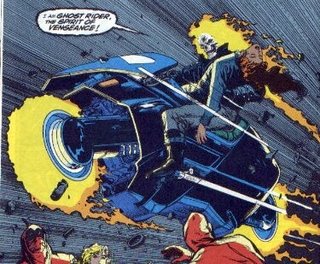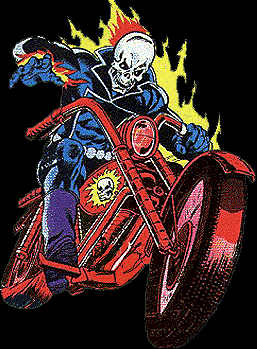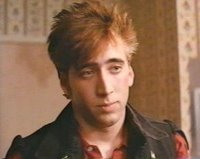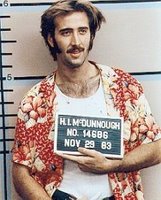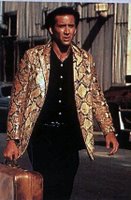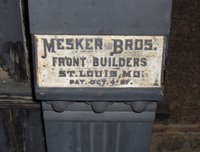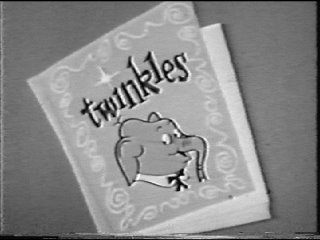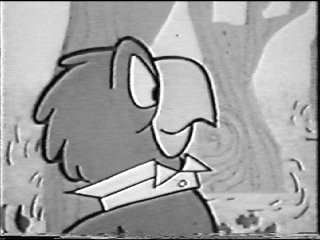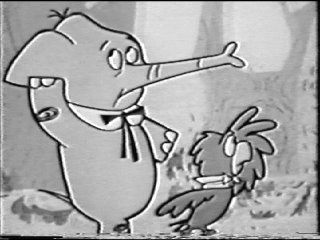Yeah, it's pretty frickin' huge...Sorry, I guess.At the end of
part seven, Patrick "Psychoman" Bateman revealed even more of his superpsycho superpowers with an inhuman ability to aim at a terrified prostitute running for her life, down several flights of stairs, with a chainsaw
and hit her.
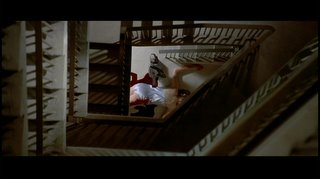 At lunch with his fiance, it is still on his mind.
At lunch with his fiance, it is still on his mind.
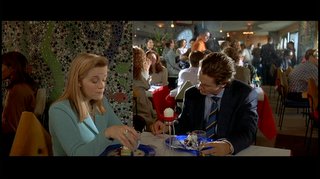
In
part one, I mentioned by the end of the book, the reader might actually feel a little bit sorry for Patrick Bateman. One reason is because he several times confesses his crimes and/or seeks help, but the people to whom he confess don't listen or believe him.
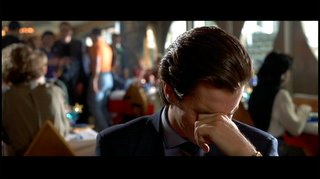 "My...my need to engage in...homicidal behavior on a massive scale cannot be, um, corrected," I tell her, measuring each word carefully. "But I...have no other way to express my blocked...needs." I'm surprised at how emotional this admission makes me, and wears me down; I feel light-headed. As usual, Evelyn misses the essence of what I'm saying...
"My...my need to engage in...homicidal behavior on a massive scale cannot be, um, corrected," I tell her, measuring each word carefully. "But I...have no other way to express my blocked...needs." I'm surprised at how emotional this admission makes me, and wears me down; I feel light-headed. As usual, Evelyn misses the essence of what I'm saying... (p. 338)
Bateman breaks off his engagement with Evelyn, and hits the streets for a little of the old
ultraviolence.
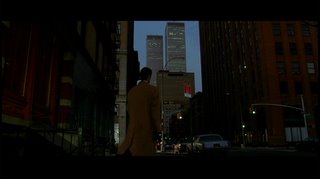
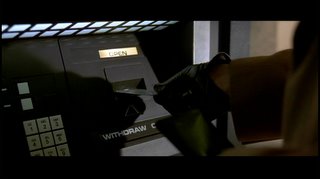
As he's getting a pile of cash (as we've seen, some prostitutes will do
anything for money), he has a pseudo-
Son of Sam moment with the ATM (
not in the book, by the way).
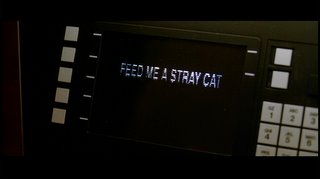 FEED ME A STRAY CAT
FEED ME A STRAY CAT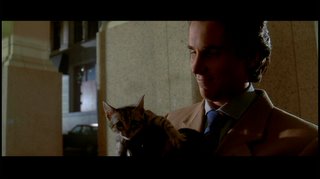
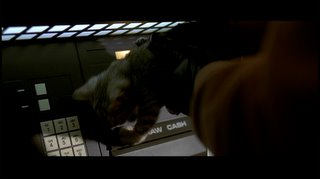
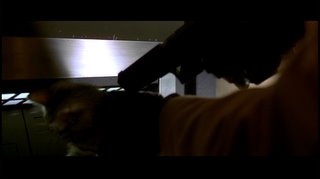
But see, he isn't
completely insane. He has realized the kitty
won't (he's not totally delusional) fit into the card slot, and
reasonably concludes that it's a job for the pistol he's carrying.
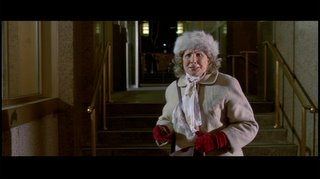
Too bad for him, a woman witnesses this, and because she has not received the same message Bateman has from the ATM, she protests.
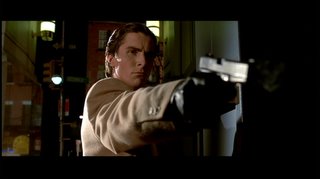 Well, it's too bad for her, really.
Well, it's too bad for her, really.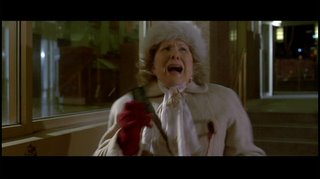
Some of New York's finest just happen to be patrolling the area, and the chase is on.
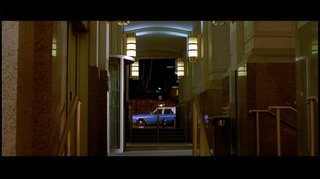
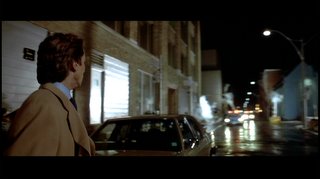
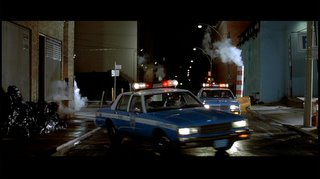
Bateman, being a superpsycho, with superpsycho powers, of course has special, superpsycho, superhero toys. In this instance, he's carrying a special pistol, that among other things, has a clip which appears to hold around twenty rounds.


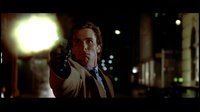

Bateman's superpsychopistol also makes squad cars go boom, with big ol' purty 'splosions.

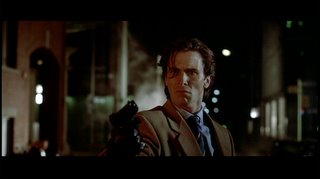
This sequence of events is from a chapter titled "Chase, Manhattan", and Bret Easton Ellis changes the narrative point of view, shifting from first person to third person, limited. I would guess this is done to emphasize how out of control Bateman is, by the end. He is even out of his own body (in a narrative sense).
Bateman tries to make it back to his office as the police chase him down.
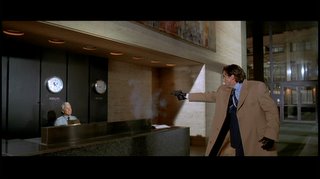 ...he
...he (Bateman)
realizes wrong fucking building and he whirls around, making a mad scramble for the revolving doors, but the night watchman who tried to get Patrick's attention before now waves him in, as he's about to bold out of the lobby, "Burning the midnight oil, Mr Smith? You forgot to sign in," and frustrated, Patrick shoots at him... (p. 352)
Finally making it to the right building, and up in his office, Bateman must feel like a cornered rat. A really
crazy, cornered rat.
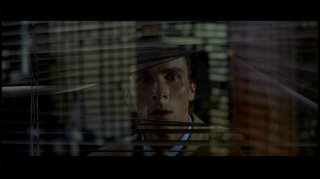
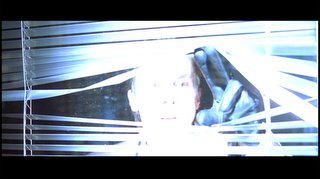
He makes a panicked call to
his fiance his dad his mom his best friend a casual acquaintance his attorney. And Ellis returns the point of view to first person.
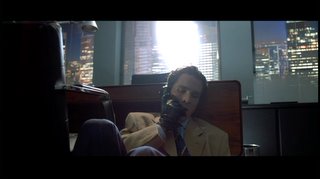 ...I decide to make public what has been, until now, my private dementia, but Harold
...I decide to make public what has been, until now, my private dementia, but Harold (Bateman's attorney)
isn't in...I leave a message, admitting everything, leaving nothing out, thirty, forty, a hundred murders, and while I'm on the phone with Harold's machine a helicopter with a searchlight appears..."I left her in a parking lot...near a Dunkin' Donuts...somewhere around midtown..." and finally, after ten minutes of this, I sign off by concluding, "Uh, I'm a pretty sick guy," then hang up, but I call back and after an interminable beep, proving my message was indeed recorded, I leave another: "Listen, it's Bateman again, and if you get back tomorrow, I may show up at Da Umberto's... so, you know, keep your eyes open"... (p. 352)

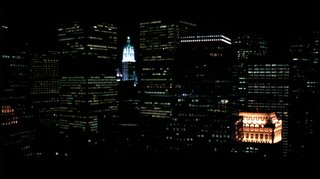 What a difference a day makes! Was it all a hallucination?
What a difference a day makes! Was it all a hallucination?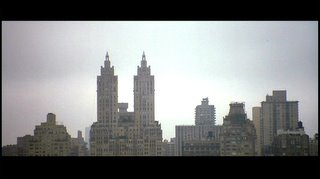 Things seem pretty normal in psycholand.
Things seem pretty normal in psycholand.


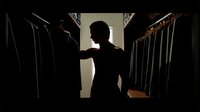
In fact, Patrick feels so comfortable after the previous evening, he returns to Paul Allen's apartment (the site of some of his most horrific acts). And it must be pretty ripe in there if Superpsychoman has to don a filter mask.

But what's this? Somebody's cleaned the place up. It has been
flipped.
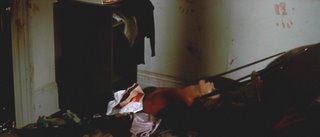 After:
After: Before:
Before: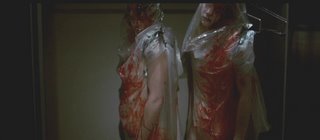 After:
After: Poor Psychoman. Someone has taken all his toys!
Poor Psychoman. Someone has taken all his toys!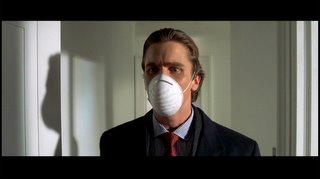
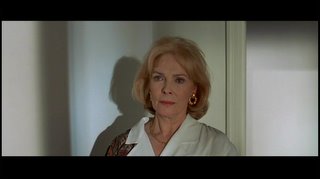 A middle-aged real estate broker walks out, offers a smile, asks, checking her book, "Are you my eleven o'clock?"
A middle-aged real estate broker walks out, offers a smile, asks, checking her book, "Are you my eleven o'clock?"
"No," I say..."I'm looking for...Doesn't Paul Owen (Allen in the film)
live here?" (p. 368)
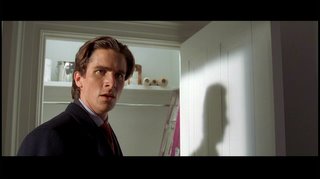
The real estate broker asks Bateman not to make any trouble, suggest he goes, and not come back...
A frazzled Bateman (his cronies describe him as "crazy-eyed") manages to keep a lunch appointment at
Da Umbertos with his fellow suits.
 And sure enough, Bateman spots his attorney.
And sure enough, Bateman spots his attorney. "So Harold," I say, "did you get my message?"
"So Harold," I say, "did you get my message?"
Carnes seems confused at first and, while lighting a cigarette, finally laughs. "Jesus, Davis. Yes, that was hilarious. That was you, was it?"
"Yes, naturally." I'm blinking, muttering to myself, really, waving his cigarette smoke away from my face.
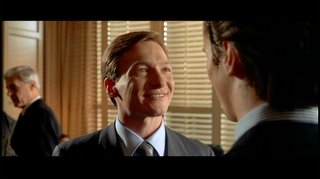 "Bateman killing Owen and the escort girl?" He keeps chuckling. "Oh that's bloody marvelous...Then, looking dismayed, he adds, "It was a rather long message, no?"
"Bateman killing Owen and the escort girl?" He keeps chuckling. "Oh that's bloody marvelous...Then, looking dismayed, he adds, "It was a rather long message, no?"
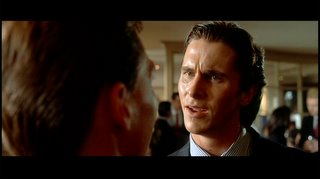 I'm smiling idiotically and then I say, "But what exactly do you mean, Harold?"
I'm smiling idiotically and then I say, "But what exactly do you mean, Harold?"
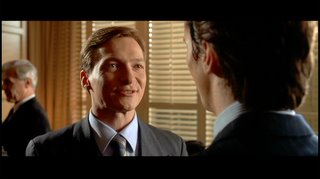 "Davis," he sighs, as if patiently trying to explain something to a child, "I am not one to bad-mouth anyone, your joke was amusing. But come on, man, you had one fatal flaw:
"Davis," he sighs, as if patiently trying to explain something to a child, "I am not one to bad-mouth anyone, your joke was amusing. But come on, man, you had one fatal flaw:
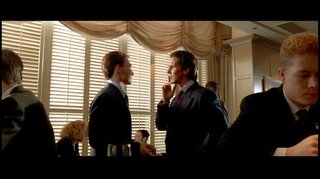 Bateman's such a bloody ass-kisser, such a brown-nosing goody-goody, that I couldn't fully appreciate it. Otherwise it was amusing."
Bateman's such a bloody ass-kisser, such a brown-nosing goody-goody, that I couldn't fully appreciate it. Otherwise it was amusing."
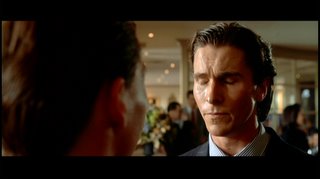
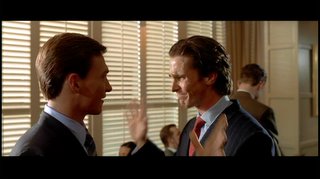
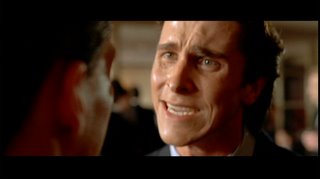 "Wait. Stop," I shout..."You don't seem to understand. You're not really comprehending any of this. I killed him. I did it, Carnes. I chopped Owen's fucking head off. I tortured dozens of girls. That whole message I left on your machine was true."
"Wait. Stop," I shout..."You don't seem to understand. You're not really comprehending any of this. I killed him. I did it, Carnes. I chopped Owen's fucking head off. I tortured dozens of girls. That whole message I left on your machine was true."
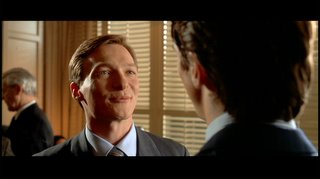 "Excuse me," he says, trying to ignore my outburst. "I really must be going."
"Excuse me," he says, trying to ignore my outburst. "I really must be going."
 "No!" I shout. "Now, Carnes. Listen to me. Listen very, very carefully. I-killed-Paul-Owen-and-I-liked-it. I can't make myself any clearer."
"No!" I shout. "Now, Carnes. Listen to me. Listen very, very carefully. I-killed-Paul-Owen-and-I-liked-it. I can't make myself any clearer."

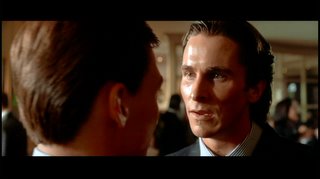 "But that's simply not possible," he says brushing me off. "And I'm not finding this amusing anymore."
"But that's simply not possible," he says brushing me off. "And I'm not finding this amusing anymore."
"It never was supposed to be!" I bellow, and then, "Why isn't it possible?"
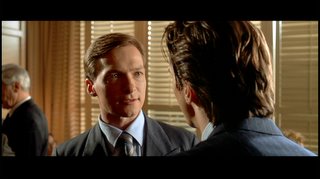 He stares at me as if we are both underwater and shouts back, very clearly, "Because...I had dinner...with Paul Owen...twice...in London...just ten days ago. Now, Donaldson," Carnes says, removing my hand from his arm. "If you'll excuse me."
He stares at me as if we are both underwater and shouts back, very clearly, "Because...I had dinner...with Paul Owen...twice...in London...just ten days ago. Now, Donaldson," Carnes says, removing my hand from his arm. "If you'll excuse me." (pp. 387, 388)
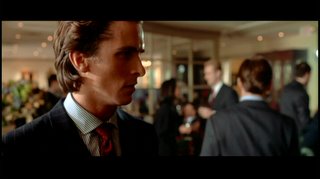
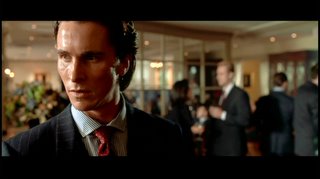 And so, at the end of the 1980s, as the nation's leader goes on national television to lie about and cover-up a certain arms-for-hostages deal, it must seem as if nothing really matters, superficial, or otherwise.
And so, at the end of the 1980s, as the nation's leader goes on national television to lie about and cover-up a certain arms-for-hostages deal, it must seem as if nothing really matters, superficial, or otherwise.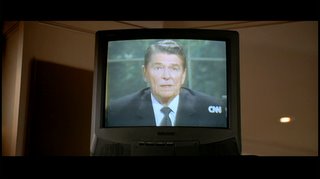
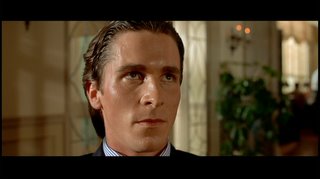

(Narration):
"There are no more barriers to cross. All I have in common with the uncontrollable and the insane, the vicious and the evil...All the mayhem I have caused and the utter indifference toward it have now surpassed...
 My pain is constant and sharp, and I do not hope for a better world for anyone. In fact, I want my pain to be inflicted on others. I want no one to escape.
My pain is constant and sharp, and I do not hope for a better world for anyone. In fact, I want my pain to be inflicted on others. I want no one to escape.
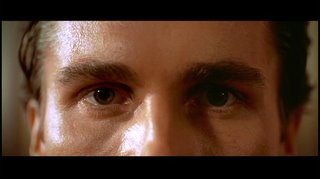 And even after admitting this, there is no catharsis. My punishment continues to elude me, and I gain no deeper knowledge of myself.
And even after admitting this, there is no catharsis. My punishment continues to elude me, and I gain no deeper knowledge of myself.
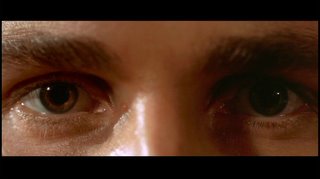 No new knowledge can be extracted from my telling. This confession has meant nothing."
No new knowledge can be extracted from my telling. This confession has meant nothing." (End narration) (Fade out)





